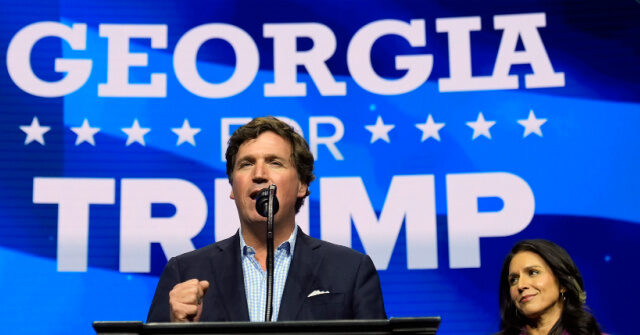At the recent Turning Point rally in Duluth, Georgia, Tucker Carlson delivered a compelling speech aimed at energizing supporters of former President Donald Trump. He criticized the Biden-Harris administration, highlighting what he views as the “managed decline” of the nation which has frustrated voters. Carlson’s portrayal of the political landscape emphasizes a disconnect between the Washington, D.C. establishment and ordinary Americans, whom he believes are suffering from the consequences of policies that prioritize elite interests over the well-being of everyday citizens. The rally exemplified the growing contempt among populist supporters for what they see as a self-serving political class.
Carlson’s rhetoric at the rally was strikingly emotive as he invoked familial imagery to address the state of the nation. He referred to the accountability needed from leaders as akin to a father returning home to enforce discipline. He suggested that the lack of accountability in Washington has emboldened bad behavior among politicians, mirroring a parental role in the upbringing of children. Carlson likened his response to that of a stern father who must confront his children when they misbehave, emphasizing that such confrontations—while uncomfortable—are necessary to restore order and justice.
In his speech, Carlson framed the situation in a manner that resonated with his audience, suggesting that many Americans feel frustrated and betrayed by the political elite. He evoked a sense of urgency, claiming that voters are no longer willing to tolerate misconduct and inaction from those in power. Through his vivid language and analogies, he sought to inspire his listeners to take a stand against what he termed the “outrageous behavior” of politicians who disregard the struggles of average Americans. This rallying cry for accountability effectively galvanized his supporters and provided a hopeful narrative of reclaiming justice in their favor.
The language and imagery used by Carlson drew significant attention, even from critics who found his comments extreme. Democratic officials were quick to respond to his remarks, with campaign representatives expressing bewilderment and highlighting the divisive nature of such rhetoric. This indicates how Carlson’s populist messaging continues to stir controversy and backlash from opposition figures who perceive it as part of a broader trend of anti-establishment sentiment. The swift reactions from Democratic representatives underscore the heightened polarization in U.S. politics and the lengths to which both sides will go in critiquing each other.
Carlson’s speech can be seen as emblematic of the broader themes in contemporary political discourse where populism plays a significant role. The call for accountability and the disdain for elite control resonate strongly with many voters who feel overlooked by institutional politics. Through his fiery oratory, Carlson taps into a sense of frustration and a desire for change among people who believe that their values and interests are being sidelined. This populist discourse has proven effective in rallying support and shaping the narrative around the Republican Party’s strategy moving forward.
In conclusion, Tucker Carlson’s remarks at the Duluth rally not only reflect frustrations with the Biden-Harris administration but also encapsulate the sentiments of a populist movement advocating for a return to accountability in leadership. By employing familial analogies and evoking strong emotional responses, Carlson successfully connected with his audience, reinforcing their dissatisfaction with the current political climate. The implications of his speech extend beyond immediate political rallying; they signify a potential shift in how political leaders engage with their constituents and highlight the enduring divide in American political culture. Through this lens, the evolving dynamics within the Republican Party and its integration of populist themes will likely continue to shape its approach leading into upcoming elections.

